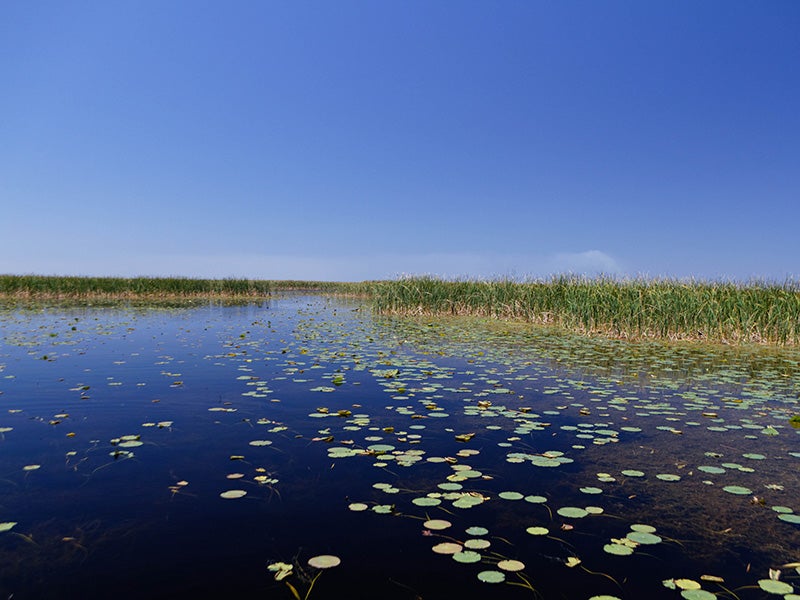Polluting of Lake Okeechobee Must End, Court Rules
Backpumping by industrial agricultural operations is allowing pollutant-laden waters into drinking water sources.

This page was published 11 years ago. Find the latest on Earthjustice’s work.
For more than 30 years, the big lake that looks like a hole on the Florida map at the top of the Everglades—714-square-mile Lake Okeechobee—has been wrecked by government-sanctioned pollution.
But we won a decision in federal court March 28 that, we hope, will put a stop to it. Florida’s biggest newspaper, The Tampa Bay Times, called the ruling “long-awaited clarity and common sense” and “a victory for public health and the environment.”
We agree.
Our case was 11 years in the making—we first filed it in 2002 to challenge the practice of “backpumping.” Backpumping works like this: South Florida sugar and vegetable growers pump the public’s waters out of Lake Okeechobee to irrigate fields. They wash the water over their industrial-sized crops, where it gets contaminated with fertilizers and other pollutants. Then, the agribusinesses get taxpayers in the South Florida Water Management District to pay to pump the contaminated water—along with some polluted run-off from industrial areas and city streets—back into Lake Okeechobee, where it pollutes public drinking water supplies for West Palm Beach, Fort Myers and the entire Lower East Coast metropolitan area.
In our case, we contended that the South Florida Water Management District is violating the Clean Water Act by allowing the agricultural companies to send fertilizer-laden water into public water supplies, instead of cleaning it up first.
U.S. District Judge Kenneth M. Karas in the Southern District of New York ruled that the water transfer practice does, indeed, violate the Clean Water Act. The case ended up in New York because clean water groups and several states also challenged the practice of allowing dirty water transfers into public water supplies without Clean Water Act protections. All the cases—including Earthjustice’s Florida case on behalf of Friends of the Everglades, Florida Wildlife Federation and the Sierra Club—were bundled together.
As I told reporters: It’s well established by now that a city can’t just dump sewage into a river—they’ve got to clean it first. The same principal applies here with water pumped from contaminated drainage canals.
“The ruling puts the water management district and the EPA on notice that their first obligation is to public health, not to agribusiness,” The Tampa Bay Times wrote in an editorial. “The excessive nutrients wouldn’t flow to the lake without the state pumping them there. And recirculating these excessive nutrients hurts the entire basin.
The ruling affirms the role the federal government needs to play in ensuring state compliance with the Clean Water Act. And it should crack down on future abuses by clarifying when operators must seek a discharge permit.”
We now hear that the South Florida Water Management District is planning an appeal. That’s a shame. They should be using our tax money to clean up the drinking water instead of going to court to fight for agribusinesses to keep polluting.
The Florida regional office wields the power of the law to protect our waterways and biodiversity, promote a just and reliable transition to clean energy, and defend communities disproportionately burdened by pollution.